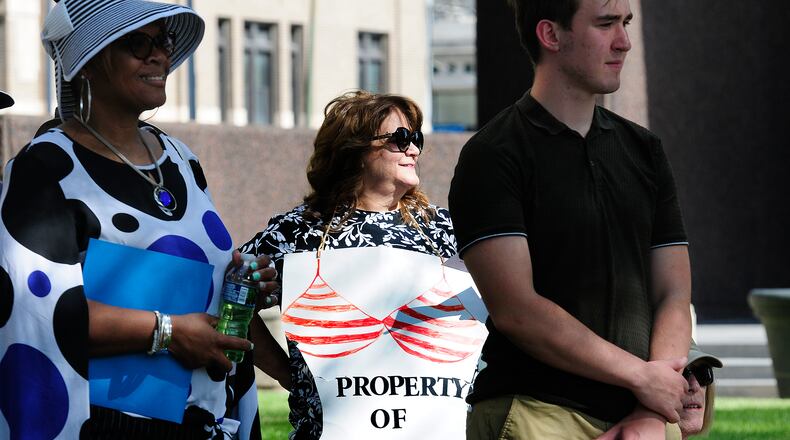“This is the most critical election that we have faced yet in terms of reproductive rights and our democracy,” said Joy Schwab of the Dayton Women’s Rights Alliance.
Ohio was one of those states, banning abortions of pregnancies where a fetal heartbeat can be detected ― typically at around six weeks ― within six hours of the Dobbs decision.
For approximately 11 weeks, the six-week ban continued in Ohio, until a Hamilton County judge authorized a preliminary injunction on the law. Court challenges continued until Ohioans last year voted in a new constitutional amendment to protect access to abortion and other reproductive decisions.
“It’s still under threat,” Schwab said outside of the Federal Building in downtown Dayton during a rally Monday.
Ohio’s amendment could be overturned by a federal abortion ban, she said.
“It’s very important that we remain vigilant and active in order to secure these rights,” Schwab said.
The National Right to Life organization made its own statement on the Dobbs decision anniversary.
“With Dobbs, the court correctly decided that a right to abortion is not in the Constitution,” said Carol Tobias, president of National Right to Life. “Dobbs gives the American people, through their elected representatives, a voice in protecting the right to life.”
One of the abortion rights rally attendees said Monday that her great aunt died of an abortion in 1905, during a period when abortions were restricted in all states before becoming criminalized in 1910, according to Planned Parenthood.
“I think women should be able to have abortions when they are needed,” said Jan Sherman, of Dayton.
Many people in her family are in the medical profession, said Sherman, who said they see a need for medical abortions.
“I don’t think the government should be in our health care,” Sherman said.
Access to abortion also impacts men, said Rose Lounsbury, a candidate running for the Ohio House district 36 seat who was at Monday’s rally.
“We often leave men out of this conversation as if somehow abortion rights don’t affect them, too,” Lounsbury said.
Lounsbury talked to one man whose wife, when she was 20 weeks pregnant with their first child, developed preeclampsia, a dangerous condition in pregnancy that is characterized by high blood pressure.
By the time they got to the hospital, his wife was not able to make a medical decision, Lounsbury said. Doctors asked him whether they should perform an abortion, saying his wife would probably die without one.
“He said, ‘Save my wife.’ To this day, they are still married and they have two healthy children. That man would be a childless widower without abortion rights in the state of Ohio,” Lounsbury said.
The Dayton rally included speakers from the local branch of the Human Rights Coalition, Planned Parenthood, the Dayton Tenants Union, and other candidates running for election this fall.
About the Author





